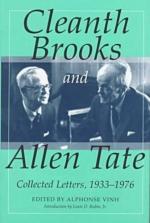|
This section contains 2,170 words (approx. 8 pages at 300 words per page) |

|
SOURCE: Newitz, Martin. “Tradition, Time, and Allen Tate.” The Mississippi Quarterly 21, no. 1 (winter 1967-68): 37-42.
In the following essay, Newitz delineates the defining characteristics of Tate's poetry.
The plight of mankind in a mechanized age seems commonplace and trite in literature today, but to the poet of the thirties, the problem was still new, real and very meaningful. As a Southern traditionist, Allen Tate envisions mankind living in a stagnant society, rejecting the old traditions, and moving toward a symbolic doom. Man, existing in juxtaposition to tradition and doom, must choose between these worlds which remain eternal in time. Tate conveys this theme in a unique style, employing many established devices, yet remaining free from formal limitations. However, in dealing with man's dilemma, he is not free from the influence of other poets; the overtones of three famous writers can be easily identified.
Although Tate is deeply concerned...
|
This section contains 2,170 words (approx. 8 pages at 300 words per page) |

|


